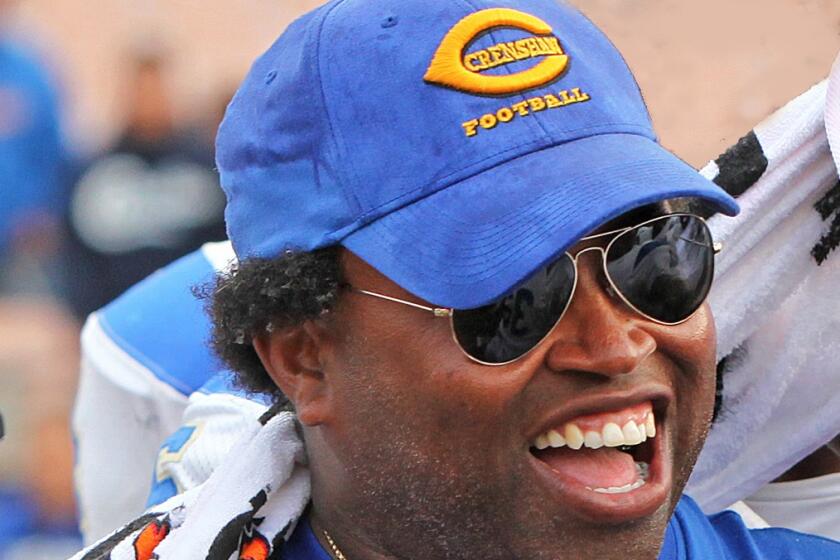Keeping a Tight Rein on Racetrack Scams
Itâs the eighth race at Hollywood Park, the horses are heading into the far turn and Windy Treat is making his move. As he glides around the turn and inches past Brimfield Bound with an eighth of a mile to go, the 14,000 spectators jump to their feet and shout and plead and snap imaginary whips in an effort to speed their horses to the wire.
The entire crowd is facing the track, eyes fixed on the horses, intently following the race. The entire crowd, that is, except for two men--the stooper and the ex-cop.
The stooper is sneaking around the seats, snatching old tickets off the ground in the hopes that someone has mistakenly tossed a winner. The ex-cop is a Hollywood Park undercover security officer who is scrutinizing the stooper.
After the race--as winners rush to collect their earnings and the losers take that long, lonely walk to the parking lot--Ed Ward, a retired Los Angeles County sheriffâs lieutenant, takes the stooper into custody and escorts him to the trackâs security office.
Ward is the senior undercover security officer at Hollywood Park and, in addition to stoopers, he walks the beat searching for â10-percenters,â âdive bombers,â âodds jigglersâ and the other scammers and schemers who make their living at the racetrack.
The stoopers, considered bottom feeders among racetrack rip-off artists, are not even breaking the law--merely racetrack regulations. But Ward and the other 10 officers at Hollywood Park also track more serious crimes, such as counterfeiting, muggings, purse snatchings and tax cheating.
Scams such as stooping are banned by every racetrack in Southern California and virtually every track in the country, Ward says. Racetrack betting is so complicated today--with exactas, pick-sixes, rolling doubles, trifectas and superfectas--that bettors occasionally lose track of all the possible permutations. Sometimes they mistakenly discard winning tickets.
At Santa Anita, the only other racetrack in Los Angeles County, stoopers have fought with janitors over discarded tickets and punched security officers who have tried to take them into custody, says Richard Smith, Santa Anitaâs director of security.
Racetrack officials ban stooping because discarded tickets pick up enough dirt, gum and soda to jam the expensive parimutuel machines. Stoopers can be unsavory characters who sometimes pick pockets or grab purses off benches, Ward says. And besides, he says, once tickets are discarded, they become racetrack property.
Ward spends his eight-hour shift walking about Hollywood Park like a beat cop, nodding to the regulars, conferring with his snitches, tailing the suspicious. Ward once wore an odometer to work and, at the end of the day, he discovered that he had walked 18 miles.
Ward was hired by Hollywood Park in 1992, after 33 years with the Sheriffâs Department. He worked vice for 13 years, busting bookies and gamblers, so the racetrack was a familiar milieu. At a track filled with colorful characters, Ward is a monochromatic, anonymous presence. He is wearing a brown herringbone jacket, brown slacks, a light brown shirt, a brown tie and brown oxfords. Most patrons are aware of him only when a problem arises.
A parimutuel clerk might press a hidden buzzer. Or a security officer monitoring a video camera will put out a call. Or Ward will spot something suspicious from a hidden viewing slit on the roof. Then he will emerge from the shadows, barking into his walkie-talkie.
Ward quietly trolls the upper level of the track, stops near a window that handles large transactions and points to a man in black jeans and a black sweater. The man lingers by the line, studies the patrons and nervously swivels his head about. When he spots Ward, he quickly walks off.
âThat guy,â Ward says, âis a 10-percenter.â
Ten-percenters are tax cheats. They look for big winners, and offer to cash in their tickets and take the tax hit--for 10% of the winning ticket or less.
Every track has windows that provide IRS forms, which bettors are required to fill out when a wager, at extremely long odds, comes through. Some 10-percenters hang out by these windows. Most are track fixtures, and the regulars know where to find them.
âLast week a guy won $40,000, and his tax bite will be considerable,â Ward says. âHe finds a guy--who has no annual income to speak of--to take the tax hit and he pays him a few thousand bucks. He might figure itâs worth the chance.â
Ward and the other officers hunt for 10-percenters by sifting through the IRS forms. When they repeatedly spot the same name on the forms, they call an IRS agent who is assigned to the track. Ward recently discovered that one track regular was filing three or four forms a day. This 10-percenter, however, wonât be filing false IRS forms for long, Ward says. He is scheduled for an audit.
Ward also tracks the clippers and the counterfeiters. Clippers snip the top corners off $20 bills and paste them on $1 bills. A clipper with a stack of bills, in a long line, can make a tidy profit if the parimutuel clerk is not paying attention.
Counterfeiters are a constant problem at tracks around the country. At Santa Anita, clerks will spot counterfeit bills about a dozen times every season, Smith says.
Most of the people nabbed for counterfeiting are small-time operators who pass a few bills at various windows throughout the track. But one man, a Cadillac-driving insurance salesman, was arrested in the Santa Anita parking lot with bundles of bogus twenties stuffed in his trunk.
âThe Secret Service was very interested in him,â Smith says. âWe turned him over to them. But they never got a conviction. Before trial, he fled to the Philippines.â
Playing the Odds
The odds jigglers are among the most sophisticated racetrack crooks. Before a race, the odds on the individual horses ebb and flow, depending partly on how much money is wagered. And the odds are fluid, so a bettor might place money on a longshot, only to discover that his wager has dropped to almost even money by the time the race begins.
An odds jiggler might bet a lot of money on a particular horse, to reduce the odds and scare off potential bettors. Right before the race, before too many bettors can adjust, he will cancel his bet, shooting the odds up again. Then he will make a final, last-minute bet--at the odds he wants.
Last year at Hollywood Park, a Miami man bet $8,000 on one horse, canceled shortly before race time and then made a final bet--at lower odds. A few races later, he employed the same scam with a $10,000 bet.
A racetrack computer tracks all bets, and Ward was tipped off when the large bet was canceled. He arrived at the parimutuel machine in time to take the man into custody after the second bet. It is difficult to prosecute odds jigglers and prove fraud in court. So Ward photographed the man, sent a confidential report about him to racetracks throughout the country and banned him from Hollywood Park.
In addition to esoteric gambling schemes, racetracks also are occasionally plagued by prosaic street crimes, says Smith of Santa Anita.
âOne guy would follow bettors into bathrooms, strong-arm them and steal their money,â Smith says. âHeâd wear three layers of clothing and as he ran, heâd shed layers. That way, when a description was put out on him, security would have a hard time nabbing him as he blended into the crowd.
âWe eventually arrested this guy a few weeks after he punched a parimutuel clerk and grabbed a pile of money,â Smith says. âHis sunglasses fell off in the scuffle, a fingerprint was lifted off the glasses and he was identified. He got convicted and sent to prison for a few years.â
It is impossible to estimate how much the crooks and the con artists cost racetracks and patrons every year, Smith says. But there is enough lawlessness to keep undercover officers busy.
Big winners are obvious targets, so racetracks recommend that they do not leave the track with large sums of cash. Prudent gamblers always convert their winnings to checks before they leave.
A man who had won $88,000 at Hollywood Park was murdered after he left the track bragging about his âPick-Sixesâ and âLate Triplesâ and flashing his cash. He was followed to his hotel near the airport and robbed and shot to death. A suspect was tried for the crime in 1994, but was acquitted.
âHe did everything that we recommend you donât do,â Alex Augusta, director of security at Hollywood Park, said of the victim. âHe was very flamboyant, very loud, and he was waving his money around as he walked out. He didnât want to take a check because he had partners on the tickets and wanted to give everyone their share right away.â
She Stooped to Conquer
The scammers who are so declasse that they rank beneath even stoopers are the dive-bombers, who dig through garbage cans for discarded tickets. They are crude amateurs, Smith says with distaste.
Smith has encountered a few stoopers, however, who have elevated their lowly craft to an art form.
The most famous stooper in Santa Anitaâs history was Stooping Mary, a frail, gray-haired elderly woman who wore tennis shoes and a blue cardigan sweater. Stooping Mary was so adept at her calling that, after a race, she would patrol the aisles, flipping discarded tickets over with her feet. She had memorized the winners, so she would stoop slightly, read the tickets and kick away the losers and quickly snatch up the winners.
Mary and another famous Santa Anita stooper, California Al, both died several years ago. Al was so slick, and so dedicated to his craft, Smith says, that he claimed to pocket about $3,000 a month--just from stooping.
You Win Some, You Lose Some
The stooper Ward arrests after the eighth race at Hollywood Park did not have the grace of Stooping Mary or the technique of California Al. He merely scampered between the aisles and stuffed the tickets into his pockets. After grabbing him, Ward barks into his walkie-talkie: âAdam Two. Coming down with one.â Ward then escorts the stooper down to the windowless security office in the bowels of the racetrack. The stooper is a middle-aged man in blue jeans, deck shoes and a denim jacket emblazoned with--adding insult to injury--a Santa Anita insignia. His pockets are stuffed with hundreds of discarded tickets.
Ward photographs the man, asks for his identification and fills out an incident report form. He tells the man that his name will be entered into the Hollywood Park computer, and the next time he is caught stooping he will be banned from the track.
âIf we catch you here after that, youâll be arrested for trespassing,â Ward says. âThis is private property, you know.â
After the stooper heads out the door, Ward leans back in his swivel chair and locks his fingers behind his head. He picked up one stooper today, but he still is irritated about the one who got away, a spectral presence who is the most elusive stooper at Hollywood Park. He is an unshaven man in his 60s who wears a baseball cap. Ward refers to him as âthe old man.â
âThe old man is amazing,â Ward says with admiration. âYou see him one minute and he disappears the next. Heâs like slime--he just oozes in and out of the aisles. When you try to grab him, he seems to float right into the crowd.
âI spotted him again today. But he got away again.â Ward shakes his head ruefully. âIf I spot him tomorrow,â he says, raising a forefinger, âIâm not letting him out of my sight.â
More to Read
Go beyond the scoreboard
Get the latest on L.A.'s teams in the daily Sports Report newsletter.
You may occasionally receive promotional content from the Los Angeles Times.










